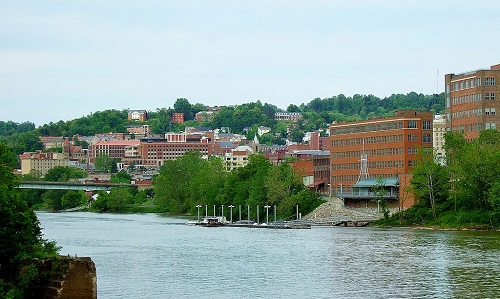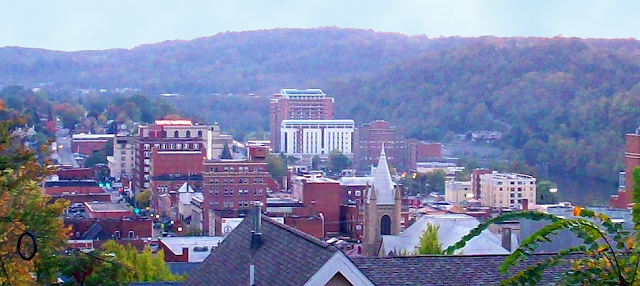historic neighborhoods industry river
shipping and personal rapid transit
Morgantown is located just south of the Mason-Dixon Line, 75 miles
(121 km) south of Pittsburgh, 208 mi (335 km) north-northwest of
Washington, D.C., 204 mi (328 km) east of Columbus and 156 miles
(251 km) northeast of Charleston, WV.
The History of Morgantown is closely tied to the Anglo-French
struggle for this territory. Until the Treaty of Paris in 1763, the
area was greatly contested by white settlers and Native Americans, and by
British and French soldiers. Several forts were built during this time,
including Fort Morgan in 1772 when Zackquill Morgan established a homestead near present-day
Fayette Street and University Avenue.
The city is comprised of several neighborhoods that were once
independent towns, including: First Ward, Woodburn, South Park, Jerome Park, South
Hills, Second Ward, Greenmont, Suncrest, Evansdale, Wiles Hill, Sunnyside,
Sabraton, the Mileground, and North Hills. While some of these are in part or
entirely outside the city limits, they are still considered part of Morgantown
as trolley cars determined how far people lived outside of the city.
Development of the DuPont Ordnance Works during World War II resulted in prefabricated
homes being constructed in Suncrest, the names of some streets reflected the
community's participation in various service organizations, such as Civitan,
Kiwanis, Lions and Rotary.
In 2000, the White House Millennium Council
designated Suncrest as a Millennium Community
South Park is
across Deckers Creek from downtown Morgantown. Originally farmland,
it was one of the first suburbs of Morgantown. In the early 20th century,
South Park experienced a housing boom, with wealthy and influential citizens
settling there. The neighborhood is designated a historic district by the National Register of Historic Places.
Following World War II, many
new families came to Woodburn, attracted by the parkland, closeness to
downtown, community atmosphere, and nearby school. In 1950, Tom and Anna Torch
opened the Richwood Avenue Confectionery, a corner store and lunch counter that
served beer in large Weiss goblets from the Morgantown Glassworks. When they
sold the operation in 1963 to Mario and Rose Spina, the establishment was nicknamed
Mario’s Fishbowl in honor of the goblets.
Transportation Morgantown relies heavily on the Monongahela River for
shipping coal and other products. The river is fully navigable from its mouth
at the Ohio River in Pittsburgh, past Morgantown upstream to Fairmont
Morgantown Lock and Dam, located in the southern part of the city.
Transit Morgantown Personal Rapid Transit PRT most of Morgantown
is accessible by the Mountain Line Transit Authority bus system. The Morgantown
Personal Rapid Transit PRT system covers 8.65 miles (13.9 km) and has five
stations.




No comments:
Post a Comment